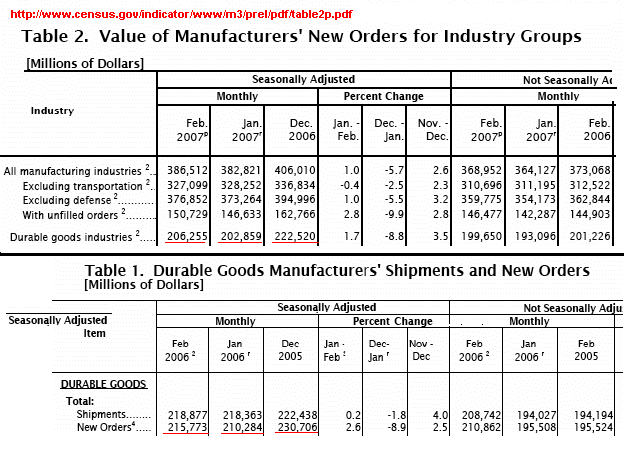Has the Recession Arrived?
Monthly Factory Orders increased only 1% for the month of February, much less than the +1.8% increase predicted. This follows January's decline of -5.7%. Over the last year, however, Factory Orders are down -1.1%. Ex-transportation orders for February declined -0.4%, following January's -2.5%. This was the 6th month out of the last 7 that ex-transportation orders have declined. February's total factory orders of $386 billion marks a 5% decline since December's seasonally-adjusted $406 billion.
Even some of the previously bullish experts are expressing newly found "concerns." Today's Factory Order report from Briefing.com states "The downward trend in factory orders is tuning in to a real economic concern. The struggling auto and housing sectors add to the softening in business capital investment as business confidence is fading with weak economic growth." They've also expressed a new concern for declining demand, as evidenced by their bolded statement "lack of demand is the heart of the manufacturing concern....." (At long last, some of the market experts are acknowledging that someone has to buy goods if they are going to be produced, and that unpurchased goods don't help the economy. Hallelujah!)
Despite this month's small increase in Factory Orders, the long term trend is clearly downward. This can be seen from the 3 graphs below from Briefing.com.



The Durable Orders decline has been even worse than overall Factory Orders decline. The recently reported Durable Goods Orders increase for February was revised from March 28th's previously stated 2.5% down to a 1.7% increase on April 4th. Comparing the last 3 months total (December, January, & February) for Durable Orders with the same 3 months from the previous year, Durable Goods Orders are down 4.7%, from a 3-month total of $663 billion to $631 billion. This can be seen from the combined, modified charts below from the Census Bureau's April 2007's Factory Orders report and March 2006's Durable Goods report. (April 2007's report is on the top, March 2006 is on the bottom. Durable Goods Orders are underlined in red.)

The American manufacturing sector is clearly in recession. Combined with rapidly declining housing sector, with a subprime meltdown that is metastasizing to other financial sectors, it's difficult to see how this can be called a "strong" economy. It is even more difficult to see how the overall economy won't drift into a recession (if it's not in one already.)

1 Comments:
A thought for your collection that I suspect will resonate, given your posts.
How to Succeed in a Global Economy
For decades the United States was effectively the only country that really mattered. We had such a tremendous advantage in wealth, manufacturing power and technology that we could afford to toss away resources, whether it be on rebuilding Europe and Japan, on engaging in the expensive arms race that broke the Soviet economy, or on misguided policies that encouraged U.S. firms to locate their activities abroad. That time is gone. We now owe more than $9,000,000,000,000 to foreign countries because we no longer sell enough things that other countries want to be able to pay for the goods that we import. Our manufacturing operations have largely relocated to other countries – we became a net importer of high technology goods for the first time in 2002, and our deficit has increased each year since then. America’s dominance of technical publications and college degrees is fading quickly and surely.
Globalization was supposed to help our country by opening up foreign markets for our products, but that presupposes that the United States produces things that other people want to buy. As foreign nations with low wage rates have improved their infrastructure, though, companies have naturally moved their manufacturing operations to locations where the wage rates are a fraction of what they are in America. The economists tell us that fact should not worry us, because of the theory of “natural advantage”. Low value, labor intensive production will move to developing nations with low wage rates, but it will be replaced by the production of high value, high technology goods here in the U.S., which will benefit everyone.
If the U.S. had sensible tax policies, that might be true. But we don’t. In our system, a corporation that earns a dollar from manufacturing high technology goods in certain countries will keep the full dollar. If they manufacture the same goods in the United States, they will keep only about 60 cents after federal and state taxes. In other words, simply by locating their high value activities abroad, a company can earn more than 50% more than if they performed the same activities in the U.S. Corporate managers are not stupid. They respond to these incentives, and the rapidly increasing number of well educated foreign workers enables corporations to shift activities to the most tax efficient location. Our “natural advantage” thus dissolves. In direct consequence, the market power of middle class American workers has been fading, leading to nearly 30 years of stagnant real income growth for the bottom 99% of our population.
The responses proposed by Congress and the I.R.S. so far have just made matters worse. The I.R.S. has been attacking U.S. research operations in a way that just encourages corporations to move their R&D to other countries. Chairman Rangel has recently proposed a measure that would encourage multinationals to fire their U.S. administrative personnel and move those activities abroad. Some in Congress have proposed subjecting U.S. multinationals to current world-wide taxation of all of their income, a move that would decrease the value of many companies by 25% or more and cause them to be acquired by foreigners with large reserves of cash in strong currencies. We cannot afford such policies any more.
There is a simple solution. The Shared Economic Growth proposal, explained in detail at www.sharedeconomicgrowth.org , would instead provide a strong incentive for corporations to move their valuable operations back inside the U.S. borders, simply by allowing corporations a deduction for dividends that they pay out. At the same time, it would increase the earnings working people receive on their pension savings by over 50%. The proposal is largely self-funding (no voodoo economics here – the corporate tax savings are directly made up for by taxes on the shareholders receiving the dividends), with the balance of the revenue made up by eliminating a couple of unnecessary and unfair distortions in our tax code, and by an extra 7.5% tax on individual income in excess of $500,000 per year. This is a small price to pay for saving our economy, restoring our economic security, giving market power back to the middle class, and boosting pension savings. The problem with the proposal is that it does not fit neatly into either party’s usual set of canned speaking points. Enacting it would require politicians to care more about policy than about politics. Does anyone out there care enough about America’s future to stop bickering and do something useful for a change?
Post a Comment
Subscribe to Post Comments [Atom]
<< Home